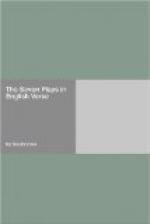Enter AEGISTHUS.
AEGISTHUS. Which of you know where are the Phocian
men
Who brought the news I hear, Orestes’ life
Hath suffered shipwreck in a chariot-race?
You, you I question, you in former time
So fearless! You methinks most feelingly
Can tell us, for it touches you most near.
EL. I know: assure thee. Else had I
not heard
The dearest of all fortunes to my heart.
AEG. Where are the strangers then? Enlighten me.
EL. Yonder. Their hostess entertained them well.
AEG. And did they certainly report him dead?
EL. Not only so. They showed him to our sight.
AEG. May this clear evidence be mine to see?
EL. I envy not the sight that waits you there.
AEG. Against their wont thy words have given me joy.
EL. Much joy be thine, if this be joy to thee!
AEG. Silence, I say! Wide let the gates
be flung!
For all the Myceneans to behold
And all in Argolis, that if but one
Hath heretofore been buoyed on empty hopes
Fixed in Orestes, seeing him now dead,
He may accept my manage, and not wait
For our stern chastisement to teach him sense.
EL. My lesson is already learnt: at length
I am schooled to labour with the stronger will.
[The
body of CLYTEMNESTRA is disclosed
under
a veil: ORESTES standing by
AEG. Zeus! Divine envy surely hath laid
low
The form I here behold. But if the truth
Provoke Heaven’s wrath, be it unexpressed.—Unveil!
Off with all hindrance, that mine eye may see,
And I may mourn my kinsman as I should.
OR. Thyself put forth thy hand. Not mine
but thine
To look and speak with kindness to this corse.
AEG. I will, for thou advisest well; but thou,
Call Clytemnestra, if she be within. [AEGISTHUS
lifts the shroud
OR. She is beside thee, gaze not otherwhere.
AEG. What do I see! oh!
OR. Why so strange? Whom fear you?
AEG. Who are the men into whose midmost toils
All hapless I am fallen?
OR. Ha! knowest thou not
Thou hast been taking living men for dead?[11]
AEG. I understand that saying. Woe is me!
I know, Orestes’ voice addresseth me.
OR. A prophet! How wert thou so long deceived?
AEG. Undone, undone! Yet let me speak one word.
EL. Brother, by Heaven, no more! Let him
not speak.
When death is certain, what do men in woe
Gain from a little time? Kill him at once!
And, killed, expose him to such burial
From dogs and vultures, as beseemeth such,
Far from our view. Nought less will solace me
For the remembrance of a life of pain.
OR. Go in and tarry not. No contest this
Of verbal question, but of life or death.




